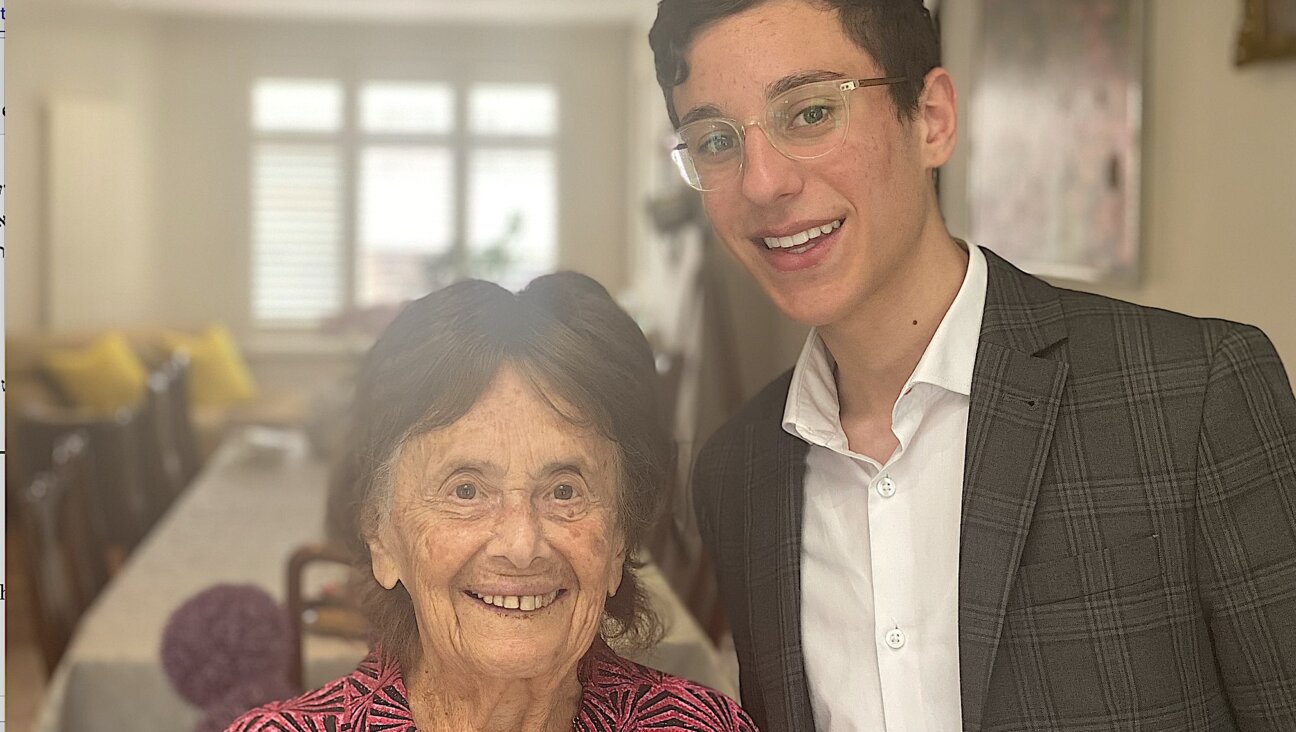Immigration Debate Seen Fueling Racist Right
A leading Jewish civil rights organization is warning that white supremacists are using the heated public debate over immigration reform to target Hispanic immigrants and to foment anti-Latino violence.
This week, in conjunction with its annual national leadership conference in Washington, the Anti-Defamation League issued a report documenting an increase in anti-Latino rhetoric on the Internet and in radio talk shows, and an increase in anti-Latino violence. In particular, the short study claims that neo-Nazis, Klansmen and skinheads — the same white supremacist groups that typically target Jews — are increasingly directing their hateful rhetoric and actions against Hispanics.
On Monday, California Governor Arnold Schwarzenegger said that prominent Hispanic politicians, including his lieutenant governor and the mayor of Los Angeles, recently have received death threats amid the heated national debate over immigration policy.
The ADL study provides several recent examples of anti-Latino rhetoric and violence, but not concrete statistics on the number of incidents. For example, it notes that New Jersey talk show host Hal Turner has called repeatedly for the killing of illegal aliens and of those who advocate on their behalf.
The prominent focus on immigration and anti-Hispanic bigotry at the ADL conference marked a sharp departure from the attention generally paid at the organization’s past conferences to antisemitism and Middle East-related issues. At the same time, however, this year’s program reflected the growing mobilization of American Jewish groups in recent months to protect the rights of undocumented immigrants and support more liberal approaches in Congress to immigration reform.
Several Jewish communal leaders said that their pro-immigrant lobbying was motivated by moral concerns, as well as by a desire to develop stronger political ties with American’s growing and increasingly influential Latino population.
“However we resolve the issue of immigration, the impact of the Hispanic community in this country is growing by leaps and bounds,” said Abraham Foxman, national director of the ADL. Soon they will be able to leverage their power in Congress to influence issues of fundamental concern to American Jews.
They will “have a say [on whether to send] aid to Israel and Egypt or to Columbia and Argentina,” Foxman said. “On the domestic front, they come from a different tradition on church-state relations.”
Foxman, who devoted his speech Monday at the ADL conference to condemning anti-Hispanic discrimination and to calling for a more humane immigration policy, told the Forward that his organization’s position is “both altruistic and selfish at the same time.”
“If we want other communities to be responsive to our anguish and concerns,” Foxman said, “then we — at the very least — need to be concerned about theirs.”
Most Jewish groups support a compromise Senate bill, which would tighten border security to reduce illegal immigration while providing a way for most of America’s estimated 11 million undocumented immigrants to obtain citizenship. President Bush this week also signaled his support for the Senate’s legislative approach and criticized those who are pressing for a mass deportation of undocumented workers as well as demonizing illegal immigrants. “I know that this is an emotional debate and I understand it’s emotional,” Bush said, “but one thing we cannot lose sight of is that we’re talking about human beings, decent human beings.”
The Senate bill differs from the one passed last year by the House of Representatives, which deals almost exclusively with efforts to reduce the flow of illegal immigrants.
“The Jewish community is responding extremely actively and passionately to the question of immigration reform,” said Gideon Aronoff, the Hebrew Immigrant Aid Society’s new president and CEO. HIAS is the Jewish community’s leading immigration policy group.
Cecilia Muñoz, vice president of public policy at the leading Latino advocacy group the National Council of La Raza, said that her community was appreciative of Jewish groups’ efforts on the immigration issue.
“The Jewish community has a particular standing on issues involving immigrants and refugees,” she said. “There is a strong emotional resonance and a strong moral voice, which is very, very valuable in this debate.”
In February, HIAS joined 31 other national Jewish agencies and local communities in signing a letter to the Senate leadership calling for comprehensive reform that would pave the way for many illegal immigrants to gain legal status.
“As leaders of Jewish community organizations, we look both to the teachings of our Jewish religious and ethical tradition and to core American values relating to immigrants for guidance on immigration reform,” the groups and communities stated in their letter. “They call on us to ‘welcome the stranger,’ and provide an effective legal immigration system characterized by rule of law, national interest and compassionate treatment.”
Although border security is a key concern for Jewish groups, the opportunity to reach out to the Hispanic community is a stronger motivation for getting actively involved in the immigration debate, Jewish activists said. “This happens to be very strong bridge-building material,” said Hadar Susskind, who heads the Washington office of the Jewish Council for Public Affairs. The council is a consultative body that brings together 13 national Jewish agencies, including the ADL, and 123 local community-relations councils for coordinated action.
Foxman said that one reason it is important for the Latino community to see Jewish groups take pro-immigration positions is that Hispanics are “disproportionately infected with antisemitism” in comparison to the overall American public. According to a 2002 ADL survey, 14% of the overall American population is strongly antisemitic; among Latinos, the figure was 35%. Only 20% of American-born Hispanics displayed such attitudes, with the figure jumping to 44% for foreign-born Hispanics living in America.
“This is an opportunity,” Foxman said, “for us to stand together and deliver the message that we have a joint concern for bigotry, and bigotry goes not only against them but against us, as well.”





















